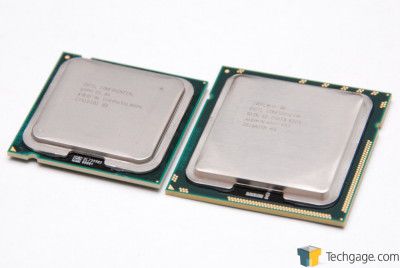- Qualcomm Launches Snapdragon 4 Gen 2 Mobile Platform
- AMD Launches Ryzen PRO 7000 Series Mobile & Desktop Platform
- Intel Launches Sleek Single-Slot Arc Pro A60 Workstation Graphics Card
- NVIDIA Announces Latest Ada Lovelace Additions: GeForce RTX 4060 Ti & RTX 4060
- Maxon Redshift With AMD Radeon GPU Rendering Support Now Available
Retail Core i7 Processors Are Memory/QPI Unlocked
If I had to guess, I’d assume that the majority of people reading our site are interested in overclocking in some way or another. Few of us can build a new machine and not have the word “overclock” linger in our head. Most of us can’t stand using a computer at its stock speeds, even if it happens to be extremely fast. There’s just something in us, and it’s hard to shake. Luckily, recent CPUs from both AMD and Intel have been catering to overclocking enthusiasts, with huge frequencies being reached… and most of them stable.
Unless you buy an Extreme Edition or Black Edition processor though, certain limits are imposed. When Core i7 was first launched, these limits were the CPU (or BCLK) multiplier, memory multiplier and also the QPI clock. On the i7-920 and i7-940, the maximum memory clock allowed was DDR3-1066, while the QPI was limited to 4.8GT/s. Well, I may be way out of the loop, but I somehow overlooked the fact that retail chips have since dropped the latter two limits… a great thing for overclockers.
While the CPU multi is still locked, it’s been confirmed by Intel to us that both of the non-EE models can utilize higher memory clocks and also utilize a 6.4GT/s QPI bus. As we found out shortly after launch, the QPI doesn’t make a significant difference, at least past 4.8GT/s, but the increased memory abilities will be appreciated by many. That means the chance at lower latencies, higher bandwidth, and faster performance. Not a bad deal.
As it turns out, Maximum PC stumbled upon an unpublicized feature of production 940 and 920 Core i7 parts. According to the publication, it had verified on three previous 920 and 940 CPUs that there was no access to Turbo Modes and that QPI was locked to 4.6GT/s along with locked memory settings.
| Source: DailyTech |
Discuss: Comment Thread
|





